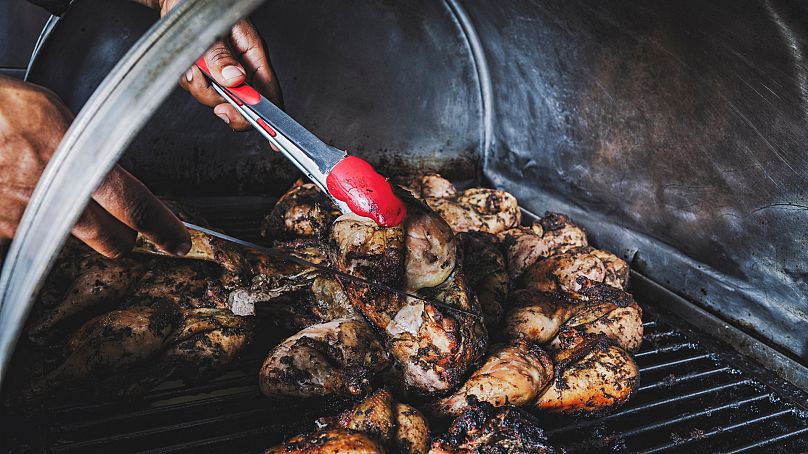From Jamie Oliver's jerk rice to Uncle Roger's criticism of bad fried rice, if you come at a culture's culinary favourites, you better not miss...
“¡Dios mío! ,” Spaniards around the world collectively gasped when they heard that British food retailer Marks & Spencer was set to launch a new product – the Spanish Chorizo Paella Croquetas.
M&S had stormed in like a raging Pamplona bull and trampled all over the memories of their wonderful Abuela’s cooking with this act of culinary sacrilege.
The dish is quite the cultural mishmash. The Valencian paella is considered one of Spain’s national dishes. Chorizo (English pronunciation depends on how insufferable you are) is pork sausage from the Iberian Peninsula. But croquetas – better known as “croquettes” – are distinctly of French origin.
How anyone dared to ever combine the Spanish national dish of Paella with the croquette – a dish from a neighbouring country and also a mainstay of all Spanish tapas – is unimaginable for the British food shop.
Naturally, terminally online Spaniards took to the internet to air their disgust.
First of all, The Times foreign correspondent in Spain, Simon Hunter, took to X with a picture of the unacceptable dish and wrote “NO NO NO”.
A Spanish user immediately responded: “Let us call for consultation the ambassador of the country whose inhabitant has committed such ignominy. Right now.”
Hunter suggested getting UK ambassador to Spain Hugh Elliott to weigh in on the issue. The high-level diplomat then replied: “Chorizo, ¡si! Paella, ¡si! Croquetas, ¡si! ¡si! ¿Todo junto? ….M&S, what have you done?”
In English: “Chorizo, yes! Paella, yes! Croquetas, yes! yes! All together?... M&S, what have you done?”
However, the British ambassador soon bit back with a second reply: “Perhaps I am just hungry, but shall we sample them @SimoninMadrid? I have yet to try something from M&S Foodhall that I don’t love…who knows, maybe we’ll have to eat our words as well ??”
Hunter responded: "Absolutely! In fact maybe we should do a video/podcast special where we put all the Spanish cuisine available in the UK to the test…"
A British supermarket stocking a picnic item that’s essentially just chorizo arancini – now we’re on Italian foods – the topic of culinary cultural appropriation can be quite a serious one.
Here are some other examples of times people raised concerns about careless cuisine crossovers.
Jerk Rice
In 2018, British celebrity chef Jamie Oliver made headlines when he launched a new food item: Punchy Jerk Rice.
By trying to pair the traditional flavours associated with Jamaican jerk cooking and rice, he angered members of the British-Jamaican population, including the Labour MP Dawn Butler.
Butler asked whether Jamie knew what jerk actually meant, writing on X that “It's not just a word you put before stuff to sell products.”
Jamaican-born British celebrity chef Levi Roots also weighed in. He explained that Oliver’s jerk rice was totally inaccurate to the term. For one, it didn’t contain some key spices involved in jerk cooking – allspice and scotch bonnet – and secondly, “jerk” also indicates the way a dish is cooked. To cook “jerk style”, you typically would wrap a protein in plantain leaves and cook it over a fire of allspice branches. By this metric, it’s literally impossible to “jerk” rice.
While Roots correctly pointed out Oliver’s cultural oversight, the reason why matters of culinary cultural appropriation matter lie more within Butler’s complaints.
Culinary cultural appropriation
Food has always changed as a result of cultures colliding. After all, the tomato – so essential to Italian cooking – didn’t even make it to European shores until as late as the 16th century. However, there is a problematic trend in Western Europe where White establishments (Oliver, M&S) take a culture’s food and can profit off it, while those from the original culture make diddly squat.
With the jerk rice episode, many people noted how in the UK, there is a proud tradition of British-Jamaicans opening restaurants that serve jerk food. These restaurants are rarely expensive and often serve the local community. Naturally, it’s a bit uncomfortable when a White-British chef takes that cuisine to make massive nation-wide profits.
One comedian has found the funny side in culinary cultural appropriation. London-based Chinese-Malaysian comedian Nigel Ng became an internet sensation when his Uncle Roger character criticised multiple British chefs’ inability to make basic dish egg fried rice.
Whether it was his mock-horror at BBC chef Hersha Patel as she drained the rice or his genuine terror when Jamie Oliver (again!) added chilli-jam to his recipe, Ng has converted his shock into legions of fans and a tour for the Uncle Roger character.
So, should the British-Spanish population rise up to take down the monolith that is M&S?
It’s something to think about the next time you’re stocking up for a picnic hamper.












